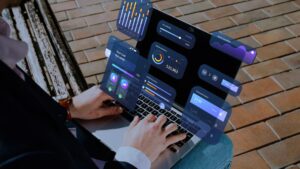Artificial Intelligence (AI) has evolved from a futuristic concept to a transformative force reshaping the tech industry. By 2025, AI is no longer just an auxiliary tool—it’s the backbone of innovation, efficiency, and competitive advantage. From automating mundane tasks to enabling breakthroughs in quantum computing, AI is redefining how businesses operate, how products are developed, and how consumers interact with technology.
In this article, we’ll explore the profound impact of AI on the tech industry in 2025, covering key trends, applications, challenges, and future possibilities.
AI-Driven Automation: The Rise of Hyper-Efficiency
The Shift from Manual to Autonomous Systems
By 2025, AI-powered automation has permeated nearly every sector of the tech industry. Businesses are leveraging AI to:
- Automate IT operations (AIOps) for predictive maintenance.
- Streamline customer service with advanced chatbots and virtual assistants.
- Optimize supply chains with AI-driven logistics and inventory management.
Impact on Workforce Dynamics
- Job Transformation: While AI eliminates repetitive tasks, it also creates new roles in AI supervision and ethics.
- Human-AI Collaboration: Employees now work alongside AI co-pilots, enhancing productivity.
AI in Software Development: The Era of Self-Coding Systems
AI-Assisted Coding Tools
- GitHub Copilot X & Amazon CodeWhisperer: AI suggests code snippets, debugs, and even writes entire functions.
- Low-Code/No-Code Platforms: AI enables non-developers to build applications with minimal coding knowledge.
The Future of DevOps
- AI automates testing and deployment, reducing human error.
- Self-healing software detects and fixes bugs in real time.
AI-Powered Cybersecurity: Smarter Defense Mechanisms
AI vs. Cyber Threats
- Behavioral Analysis: AI detects anomalies in network traffic to prevent breaches.
- Deepfake Defense: AI tools identify and neutralize AI-generated phishing attacks.
Challenges
- AI-Powered Cyberattacks: Hackers use AI to bypass security, creating an arms race.
4. AI and Cloud Computing: The Next Evolution
AI-Optimized Cloud Services
- AWS, Google Cloud, and Azure now offer AI-driven cloud orchestration.
- Serverless AI: Developers deploy AI models without managing infrastructure.
Edge AI: Faster, Smarter Computing
- AI processes data locally (e.g., IoT devices), reducing latency.
AI in Data Analytics: Real-Time Decision Making
Predictive and Prescriptive Analytics
- AI analyzes vast datasets to forecast trends (e.g., stock markets, healthcare outcomes).
- Generative AI creates synthetic data for training models without privacy risks.
Business Intelligence (BI) Revolution
- Tools like Tableau and Power BI now integrate AI for instant insights.
AI in Hardware: Smarter Chips and Quantum Computing
Neuromorphic and AI-Specific Chips
- Companies like NVIDIA, Intel, and IBM design chips optimized for AI workloads.
Quantum AI
- Quantum machine learning solves problems 100x faster than classical computers.
Ethical AI: Addressing Bias and Regulation
AI Governance in 2025
- Stricter regulations (e.g., EU AI Act) ensure transparency.
- Bias Mitigation: AI models are audited for fairness.
The Explainability Challenge
- Businesses must justify AI decisions, especially in healthcare and finance.
AI in Consumer Tech: Personalization at Scale
AI in Everyday Devices
- Smartphones: AI enhances photography, battery optimization, and voice assistants.
- Smart Homes: AI predicts user preferences (e.g., adjusting thermostats).
The Metaverse and AI
- AI generates hyper-realistic avatars and dynamic virtual worlds.
The Future of AI: Predictions Beyond 2025
- AGI (Artificial General Intelligence): Still distant, but advancements in reasoning and learning are accelerating.
- AI in Space Exploration: NASA and SpaceX use AI for autonomous spacecraft navigation.
Conclusion
AI in 2025 is not just a tool—it’s the foundation of the tech industry’s future. From automating workflows to enabling quantum leaps in computing, AI is driving unprecedented innovation. However, with great power comes responsibility. Ethical considerations, regulatory compliance, and workforce adaptation will shape how AI evolves.
For businesses and individuals, embracing AI is no longer optional—it’s essential for staying competitive in the digital age.













